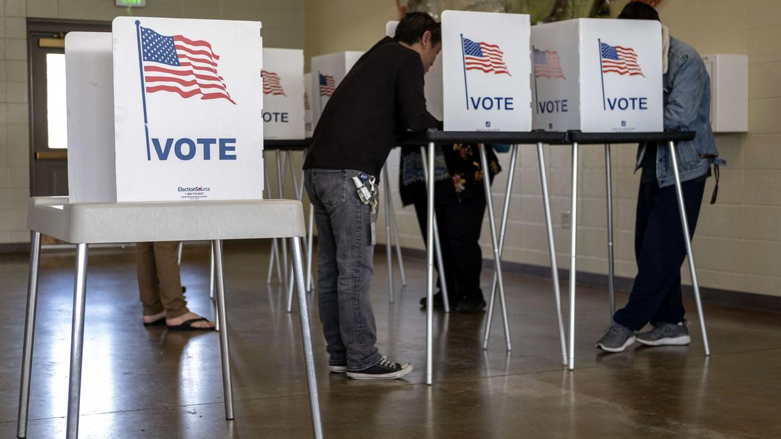US elections are defeat for Donald Trump and MAGA crowd, but will not change US Middle East policy

WASHINGTON DC, United States (Kurdistan24) – The US mid-term elections, held on Tuesday, fell far short of Republican expectations of a major victory, in significant part because of Donald Trump and his MAGA—“Make America Great Again”—followers.
Trump is a demagogic figure, unusual in America, but common enough in the Middle East. In late 2018, with Trump nearly two years in office, this reporter asked a Palestinian colleague this question: which Middle East leader was most like Donald Trump.
Gamal Abdul Nasser was his answer—the very figure whom I was thinking about: Gamal Abdul Nasser. An Arab nationalist demagogue, Nasser had helped to overthrow the Egyptian monarchy in 1952, then ousted an older colleague.
Nasser led Egypt from 1954 to 1970, dying of a heart attack in September of that year, as he sought to mediate between Jordan’s King Hussein and the PLO chief, Yasser Arafat, in a conflict that he, himself, had helped instigate.
Nasser was only 52 years old, when he died. His popularity came from his struggle against “Zionism and imperialism”—i.e. Israel and the US, even as the results were terrible.
In 1967, in just six days, Nasser lost the Sinai, Golan Heights, and West Bank, after mobilizing troops and threatening Israel with war—prompting Israel to pre-empt.
But as long as the struggle continued, many Arabs felt good about it, and the leader whom they had embraced.
Trump is somewhat similar. He attacks an elite, whom people, at least a significant number, resent, and he tells his followers that they are the ones who have made America great.
But Trump mishandled COVID, contributing to the worst international health crisis in a century. He also precipitated the greatest challenge to US democracy since the civil war by encouraging the Jan. 6 assault on the US Capitol building.
Trump’s supporters, however, rationalize that away and focus, instead, on the positive feelings he elicited in the first place.
Republican Edge will Reinforce Anti-Iran tilt to US Policy
As of Wednesday night, key Congressional races had yet to be called, but it seemed the Republicans would take the House by a narrow majority, while the Senate remained too close to call.
US policy toward the Middle East was not on the agenda—and will not be much affected. If anything, the slight Republican edge will reinforce a shift already under way: namely, the realization within the Biden administration that it is not possible to renew the 2015 Iranian nuclear deal, formally known as the Joint Comprehensive Plan of Action (JCPOA), on terms acceptable to the US and its European partners.
Biden’s team came into office with serious misunderstandings about Iran, believing that it was Trump who was responsible for the bad relations between Washington and Tehran. Thus, the Biden administration’s top regional priority was reviving the JCPOA.
However, that has not happened, despite nearly two years of negotiations, and the effort to renew it has essentially been dropped. That development has been driven by three factors: the ongoing protests in Iran; Iran’s alignment with Russia in its war in Ukraine; and new, unacceptable, and irrelevant conditions that Iran has demanded.
Election Outcome: Pink Drizzle
The two big US parties are represented by colors: red for Republicans, blue for Democrats. In the run-up to the elections, the Republican Party leadership, particularly in the House of Representatives, predicted a “red wave” that would sweep the country.
Instead, Tuesday’s elections have produced a pink drizzle! Already on Wednesday afternoon, President Joe Biden, addressing the White House press corps, hailed the vote as “a good day for democracy.”
Usually, the political party of a first-term president loses a significant number of seats in the mid-term elections. But the Democrats’ losses on Tuesday were relatively minor—significantly less than Biden’s predecessors.
The 2022 Republican campaign focused on two key issues: the economy, which has been hard-hit by inflation driven by the war in Ukraine, and Biden himself, who has a relatively low approval rating.
However, as Washington Post columnist Henry Olson noted on Wednesday, in analyzing the elections, voters who “somewhat disapprove” of Biden voted for Democratic candidates by four percentage points more than they voted for Republicans.
That is highly unusual, as Olson noted.
Republicans were undone by their failure to disassociate themselves from the very man whom Biden had defeated in 2020: namely, Donald Trump. Indeed, many of them embraced Trump—including Rep. Kevin McCarthy (California) the former Republican Speaker of the House who believed he could return to his old position through such tactics.
But even if the Republicans retake the House, it remains to be seen if McCarthy will realize his ambition. He was prominent among those touting an anticipated red wave and many Republicans are now mad at him and disappointed in his leadership. They may chose someone else as their speaker.
Indeed, the pink drizzle has proven to be vindication of the two Republican political figures who had the courage and integrity to stand up to Trump: Rep. Liz Cheney (Wyoming) and Adam Kinzinger (Illinois.)
Both did so, at the price of their political positions. But since they have been proven right, perhaps they will be returned to office, in even higher posts.
The embrace of Trump would hurt the Republican Party, they argued. He gets the party’s base angry and excited, so it turns out. But in the country as a whole, the MAGA crowd is a minority. Thus, most of Trump’s candidates lost—and did so in states or districts that other Republican candidates would likely have won.
How Republicans will respond to Tuesday’s setback remains to be seen. People can display a perverse tendency to stick with familiar behavior, even if it is failing. On the other hand, they might take note of the fact that Americans have twice rejected Donald Trump and then act accordingly.
Only time will tell.
